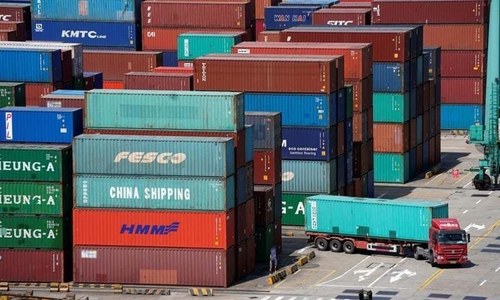KARACHI: Remittances sent by overseas Pakistanis remained above $2 billion in February for the eighth consecutive month, the State Bank said on Thursday.
If June FY20 is also counted, it was the ninth straight month when the country received over $2bn in monthly remittances.
The Covid-19 pandemic has positively impacted on remittances which increased by 24.1 per cent during the first eight months of the current fiscal (8MFY21), with the country receiving $18.742bn in the said period. In 8MFY20 the remittances grew by 5.6pc as compared to the preceding year.
The country’s total exports during the first seven months of the year — July-Jan FY21 — stood at $13.896bn which reflected the country’s growing dependence on remittances. The country’s exports are not growing despite various incentives from the government.
Inflows remain above the $2bn mark for ninth consecutive month
Remittances in February this year were $2.27bn as compared to $1.82bn in the same month in FY20, showing an increase of $441 million or 24.2pc. The inflows during the month were almost the same when compared to January FY21.
There were apprehensions among policy-makers and the State Bank that the overseas Pakistanis could lose jobs in large numbers as the Covid-19 pandemic hit various economies — particularly the Gulf countries that depend largely on oil income. However, oil prices recovered and overseas Pakistanis were able to retain their jobs.
The country received highest remittances from Saudi Arabia where the largest number of Pakistanis are employed. Pakistani workers sent $5.041bn from the kingdom, recording a growth of 19.5pc compared to 26.3pc in the same period in FY20.
Pakistan received the second-highest remittances of $3.936bn from the United Arab Emirates, registering a growth of 6.2pc compared to last year’s growth of 22.2pc.
The highest growth in remittances was noted from the UK which jumped by 56.2pc while the inflows rose to $2.529bn during 8MFY21. In the same period of FY20, growth was negative with 26.5pc.
Inflows from countries other than the GCC states were $2.144bn, with a growth of 5.9pc compared to the same period of FY20 when remittances grew by 47.4pc.
Remittances from the US showed a growth of 46.7pc against a negative growth of 49.6pc in the same period of FY20 when the country received $1.618bn. Remittances from EU countries posted a jump of 46pc, totalling $1.707bn during July-Feb FY21 compared to $1.170bn in 8MFY20.
Though bankers and currency experts offer a number of reasons for the higher remittances, there is consensus that inflow of remittances through sources other than banks has almost come to an end. This was due to extremely low dollar demand in the open market while the market is not in a position to offer even a single paisa more than the prevailing rate.
“Policy measures undertaken by the government and SBP to encourage inflows through formal channels, limited cross-border travel due to Covid-19, medical expenses and altruistic transfers to Pakistan amidst the pandemic, and orderly exchange market conditions contributed to this sustained rise in workers’ remittances,” the central bank said in a statement issued on Thursday.
Published in Dawn, March 12th, 2021















































